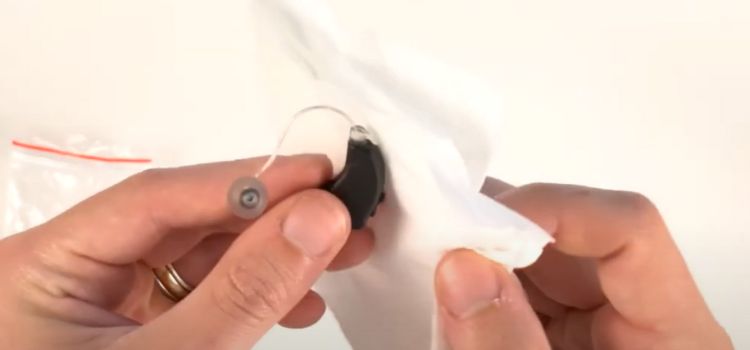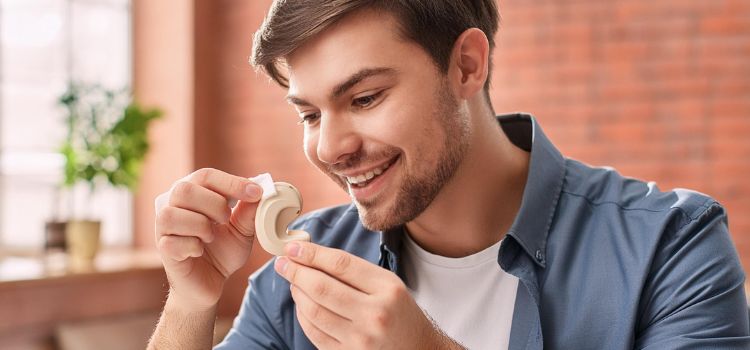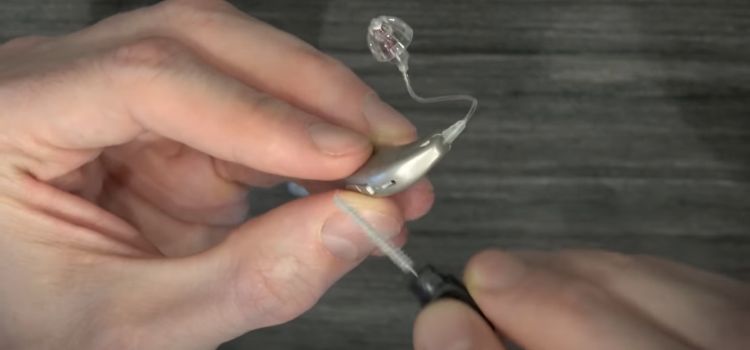Yes, you can clean hearing aids with baby wipes. Using baby wipes is a convenient and effective way to remove dirt, oils, and wax buildup from your hearing aids.

Keeping your hearing aids clean is crucial for maintaining their performance and longevity. Baby wipes are gentle enough to clean the delicate components of the hearing aids without causing damage.
However, it is important to use fragrance-free and alcohol-free baby wipes to prevent any potential irritation to your skin or damage to the hearing aids’ surfaces. Regular cleaning with baby wipes can help ensure optimal performance and extend the lifespan of your hearing aids.
Importance Of Proper Hearing Aid Maintenance
Regular maintenance of hearing aids is crucial for their optimal performance. While baby wipes may seem convenient, it is not recommended to clean hearing aids with them. Instead, it is advisable to use specialized cleaning tools and follow the manufacturer’s instructions to ensure proper maintenance and longevity of the device.

Hearing aids require regular cleaning and care to ensure optimal functionality and longevity. Neglecting proper maintenance can have a significant impact on the performance and lifespan of these devices.
In this section, we will explore the importance of proper hearing aid maintenance and how it can contribute to the longevity and effectiveness of your device.
Impact Of Poor Maintenance On Performance And Lifespan
- Worsened Sound Quality: Accumulated earwax, debris, and moisture can clog the tiny openings and vents of your hearing aid, resulting in muffled or distorted sound quality.
- Reduced Battery Life: Poor maintenance can lead to increased power consumption, causing your hearing aid batteries to drain more quickly and requiring frequent replacements.
- Malfunctioning Components: Dust, dirt, and moisture can negatively impact the delicate internal components of your hearing aid, leading to functional issues or complete breakdown.
- Increased Repair Costs: Neglecting regular maintenance may result in more frequent and costly repairs, as the build-up of debris can cause irreversible damage to the device.
Regular Cleaning And Care For Optimal Functionality
Proper care and maintenance can significantly improve the performance and lifespan of your hearing aids. Here are some essential steps to follow:
- Daily Cleaning Routine: Gently wipe the exterior of your hearing aids with a clean, dry cloth to remove any surface debris. Use a soft brush or hearing aid-specific cleaning tool to remove wax or debris from the microphone, receiver, and other visible parts.
- Cleaning the Earpiece: Follow the manufacturer’s instructions to detach the earpiece or earmold from the hearing aid. Rinse the earpiece with water or use a mild soap solution to remove any earwax or oils. Thoroughly dry the earpiece before reattaching it to the hearing aid.
- Avoiding Moisture: Remove your hearing aids before showering, swimming, or engaging in any water-related activities. Consider using a hearing aid dehumidifier or drying kit to remove any moisture that may accumulate inside the device.
- Regular Professional Check-ups: Schedule regular check-ups with your hearing care professional for professional cleaning and maintenance. They can inspect your hearing aids for any issues, perform deep cleaning, and make necessary adjustments.
By following these maintenance tips and implementing a regular cleaning routine, you can ensure the optimal functionality and prolong the lifespan of your hearing aids. Taking proper care of your device will not only enhance your listening experience but also save you from unnecessary expenses and frustrations.
Understanding Hearing Aid Cleaning Methods
Understanding Hearing Aid Cleaning Methods is crucial for maintaining optimal performance. While it may be tempting to use baby wipes for cleaning, it is not recommended as they can leave residue and damage the delicate components of hearing aids.

Hearing aids are essential devices that require regular cleaning to ensure their optimal performance and longevity. However, it’s crucial to understand the different methods available for cleaning hearing aids and the pros and cons associated with each approach. Let’s explore them below:
Different Methods For Cleaning Hearing Aids
- Dry cloth or tissue: Gently wiping your hearing aids with a soft dry cloth or tissue can help remove surface dirt and debris. This method is quick and convenient, making it suitable for daily cleaning routines.
- Brush: Using a small brush specifically designed for hearing aid cleaning can help dislodge stubborn debris from hard-to-reach areas, such as the microphone or sound outlet. It is vital to use gentle strokes to avoid damaging the delicate components of the device.
- Alcohol wipes: Cleaning your hearing aids with alcohol wipes can effectively eliminate bacteria and germs that may accumulate on the device. However, it’s essential to use alcohol wipes specifically designed for hearing aids and avoid harsh chemicals that can corrode the device.
- Dehumidifier: Placing your hearing aids in a dehumidifier overnight can help remove moisture and condensation that may have built up during the day. Dehumidifiers are especially useful for individuals living in humid climates or those who perspire heavily.
- Cleaning kit: Investing in a hearing aid cleaning kit can provide you with the necessary tools and solutions to clean your device thoroughly. These kits often include items such as cleaning solutions, brushes, wax removal picks, and drying containers.
Pros And Cons Of Each Method
Dry cloth or tissue:
- Quick and convenient
- Removes surface dirt
- May not effectively clean hard-to-reach areas
Brush:
- Dislodges stubborn debris
- Reaches difficult areas
- Requires careful and gentle handling to prevent damage
Alcohol wipes:
- Effective in eliminating bacteria and germs
- Not suitable for all hearing aid models
- Can potentially damage certain components
Dehumidifier:
- Removes moisture and condensation
- Prevents damage caused by humidity
- Requires overnight use, limiting immediate cleaning needs
Cleaning kit:
- Provides comprehensive cleaning tools
- Suitable for thorough cleaning routines
- Can be expensive compared to other methods
Remember to consult your hearing healthcare professional or refer to your device’s manufacturer guidelines to determine the most appropriate cleaning method for your specific hearing aids. Regular cleaning and maintenance are vital to ensure your hearing aids function optimally, providing you with clear and reliable sound.
Pros And Cons Of Using Baby Wipes For Cleaning Hearing Aids
Baby wipes can be a convenient option for cleaning hearing aids. They are easy to use and gentle on the device. However, they may leave residue or moisture, which can impact the functionality of the hearing aid over time. Care should be taken while using them.
Convenience and accessibility:
- Baby wipes offer a convenient and accessible option for cleaning your hearing aids. Whether you’re at home, at work, or on the go, you can easily carry a pack of baby wipes with you to clean your hearing aids whenever necessary.
Gentle on the skin:
- Baby wipes are known for their gentle formula, which makes them suitable for cleaning delicate surfaces, including hearing aids. The soft and non-irritating material ensures that your hearing aids are not damaged during the cleaning process.
Effective for removing surface debris:
- Baby wipes are effective at removing surface debris from your hearing aids. They can easily wipe away dust, dirt, and other particles that may accumulate on the surface of your devices. This can help improve the overall performance and longevity of your hearing aids.
Potential risks of moisture damage:
- One of the potential risks of using baby wipes to clean hearing aids is moisture damage. Baby wipes contain moisture, and if excessive amounts of moisture come into contact with your hearing aids, it can lead to internal damage, affecting their functionality. It is important to use the wipes sparingly and ensure that your hearing aids are completely dry before using them again.
Residue left behind:
- Another downside of using baby wipes is the residue they may leave behind. Some baby wipes contain additives or fragrances that can leave a residue on the surface of your hearing aids. This residue can potentially interfere with the performance of your devices or irritate your skin. It is crucial to choose fragrance-free and alcohol-free baby wipes to minimize the risk of residue.
Potential allergy risks:
- Baby wipes may contain ingredients that can cause allergies or skin irritations in some individuals. If you have a known allergy or sensitivity to certain substances, it is important to check the ingredients of the baby wipes before using them to clean your hearing aids. To minimize the risk of allergies, opt for hypoallergenic baby wipes that are specifically designed for sensitive skin.
Using baby wipes to clean your hearing aids has its pros and cons. They offer convenience, gentleness on the skin, and effectiveness in removing surface debris. However, potential risks include moisture damage, residue left behind, and allergy risks.
It is important to consider these factors and use baby wipes cautiously, ensuring they are suitable for your specific hearing aids and skin type. As always, consulting with your hearing healthcare professional for proper cleaning recommendations is advisable.
Alternatives To Using Baby Wipes For Cleaning Hearing Aids
Looking for alternatives to using baby wipes for cleaning hearing aids? While it may seem convenient, baby wipes can leave residue on your device. Instead, consider using specialized cleaning tools designed for hearing aids to ensure effective and safe maintenance.

When it comes to cleaning your hearing aids, using baby wipes may not always be the most effective option. Fortunately, there are alternative methods that can provide a thorough and safe cleaning for your devices. Here are a few alternatives to consider:
Alcohol Wipes
- Alcohol wipes are a popular choice for cleaning hearing aids as they can effectively remove dirt, oil, and wax buildup.
- These wipes typically contain isopropyl alcohol, which is known for its disinfectant properties.
- To clean your hearing aids with alcohol wipes, simply wipe the surface of the devices, focusing on the areas where wax accumulation is common.
- Make sure to avoid using excessive force or applying alcohol directly into the hearing aid openings.
Dry Or Soft Cloth
- Another effective alternative to baby wipes is using a dry or soft cloth.
- To clean your hearing aids with a cloth, gently wipe the surface of the devices, removing any visible debris.
- Avoid using abrasive or rough materials that could scratch or damage the hearing aids.
- It’s important to note that while a dry or soft cloth can be sufficient for regular cleaning, it may not provide the same level of disinfection as alcohol wipes.
Cleaning Solutions Recommended By Manufacturers
- Many hearing aid manufacturers offer specific cleaning solutions that are designed to safely and effectively clean their devices.
- These solutions are usually gentle on the materials used in hearing aids, helping to prevent damage.
- To clean your hearing aids using a manufacturer-recommended solution, follow the instructions provided by the manufacturer.
- These solutions may require you to soak or spray your hearing aids, ensuring a thorough cleaning.
Remember, regular cleaning and maintenance of your hearing aids are essential to prolong their lifespan and ensure optimal performance. By considering these alternatives to baby wipes, you can find a cleaning method that suits your needs and helps to keep your hearing aids in top shape.
Best Practices For Cleaning Hearing Aids
Using baby wipes to clean hearing aids may not always recommended as they can contain chemicals that may damage the delicate components. Opt for specialized cleaning solutions and follow the manufacturer’s instructions for best results.
Proper Cleaning Techniques
- Wipe the exterior: Gently clean the outside of your hearing aids with a soft, dry cloth to remove any dirt or debris.
- Brush the microphone and receiver: Use a small brush provided by your hearing care professional to clean the microphone and receiver. Be sure to follow the manufacturer’s instructions for cleaning these delicate parts.
- Remove wax build-up: If you notice wax build-up on your hearing aids, carefully remove it using a wax pick or brush. Avoid using any sharp objects that could damage the device.
- Keep moisture away: Use a dehumidifier or a drying kit provided by your hearing care professional to remove moisture from your hearing aids. Never use heat sources like hairdryers or ovens, as they can cause damage.
Frequency Of Cleaning
- Daily cleaning: It’s recommended to clean your hearing aids daily to maintain optimal performance and prevent build-up of debris or wax.
- Regular deep cleaning: Schedule regular deep cleaning sessions with your hearing care professional to ensure thorough cleaning and maintenance of your hearing aids. They have specialized tools and techniques to clean hard-to-reach areas.
Tips For Maintaining Cleanliness And Hygiene
- Wash your hands: Before handling your hearing aids, always wash your hands thoroughly to prevent transferring dirt or oils to the devices.
- Avoid harsh chemicals: Only use the cleaning products and solutions recommended by your hearing care professional. Harsh chemicals or alcohol-based solutions can damage the delicate components of your hearing aids.
- Store them in a safe place: When you’re not wearing your hearing aids, store them in a dry and safe location, preferably in their protective case. This will help prevent any damage or exposure to moisture, dust, or dirt.
- Regular check-ups: Schedule regular check-ups with your hearing care professional to ensure that your hearing aids are functioning properly and to address any maintenance or cleaning concerns you may have.
Remember, proper cleaning techniques, regular maintenance, and following the manufacturer’s instructions will help ensure the longevity and performance of your hearing aids. Taking good care of them will also contribute to your overall listening experience and hygiene.
Conclusion
Baby wipes may seem like a convenient option for cleaning hearing aids, but they may not be the best choice. While they can remove some surface dirt and debris, they are not designed specifically for cleaning delicate electronic devices like hearing aids.
It is important to use cleaning products recommended by the hearing aid manufacturer to ensure the longevity and performance of the device. These cleaning products are specifically formulated to effectively remove earwax and maintain the integrity of the hearing aid.
Regular maintenance and cleaning are essential for optimal performance and to prevent damage. Remember to follow the manufacturer’s guidelines and consult with a professional if you have any concerns or questions about maintaining your hearing aids.
By using the appropriate cleaning products and techniques, you can ensure the longevity and optimal functionality of your hearing aids.
Leave a Reply